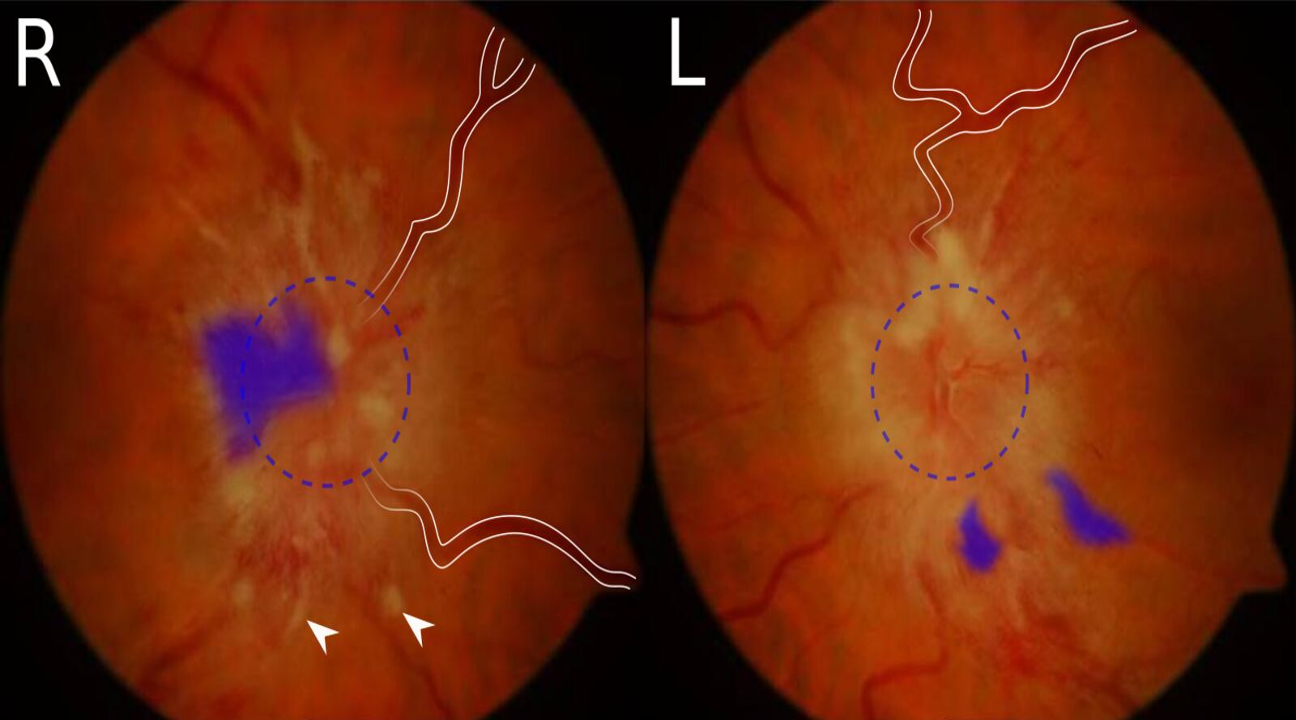
Classification system according to Keith-Wagener-Barker
| Grade | Findings | Symptoms |
|---|---|---|
| Grade I | Vessel diameter variation: arteriolar constriction and tortuosity | Usually asymptomatic |
| Grade II | Gunn sign and marked constriction of vessels and sclerosis of arterioles | Usually asymptomatic |
| Grade III | Cotton wool exudates, hard exudates, retinal hemorrhage, retinal edema, macular star formation | Decreased and/or blurred vision, headaches |
| Grade IV | Papilledema, optic atrophy | Decreased and/or blurred vision, headaches |
| X Gunn sign (Arteriovenous nicking) | ||
| A tapering of a retinal venule at the point where a retinal arteriole crosses the retinal venule; creates an hourglass shape. Associated with advanced hypertensive retinopathy. | ||
| Hard exudate | ||
| Accumulation of exudate from capillary leakage within the outer plexiform layer (Henle layer) and the inner nuclear layers of the retina. | ||
| Local treatment of retinopathy is not possible, therefore, systemic reduction of blood pressure is critical |
Bilateral papilledema- hypertensive emergency
 #X Bilateral papilledema
Fundus photography of right (R) and left (L) optic disc of the same patient:
The optic discs show severely blurred margins (dashed circle indicates supposed margin). The retinal veins are dilated and tortuous (examples marked by white lines). There are multiple peripapillary hemorrhages, which appear as flame-shaped hemorrhages (examples marked by blue overlay). Cotton wool spots are also present and appear as bright spots (examples marked by arrowheads).
These features are characteristic of papilledema. If present bilaterally, possible causes include cranial hypertension or hypertensive emergency.
Source: “Figure 1. in: A 43-year-old woman on triptorelin presenting with pseudotumor cerebri: a case report” by Uday Kumar Bhatt, Imran Haq, Venkata S. Avadhanam und Kim Bibby, Journal of Medical Case Reports, licensed under CC BY 2.0. The supplementary image with overlays of relevant areas was adapted from the image mentioned above (© AMBOSS).
#X Bilateral papilledema
Fundus photography of right (R) and left (L) optic disc of the same patient:
The optic discs show severely blurred margins (dashed circle indicates supposed margin). The retinal veins are dilated and tortuous (examples marked by white lines). There are multiple peripapillary hemorrhages, which appear as flame-shaped hemorrhages (examples marked by blue overlay). Cotton wool spots are also present and appear as bright spots (examples marked by arrowheads).
These features are characteristic of papilledema. If present bilaterally, possible causes include cranial hypertension or hypertensive emergency.
Source: “Figure 1. in: A 43-year-old woman on triptorelin presenting with pseudotumor cerebri: a case report” by Uday Kumar Bhatt, Imran Haq, Venkata S. Avadhanam und Kim Bibby, Journal of Medical Case Reports, licensed under CC BY 2.0. The supplementary image with overlays of relevant areas was adapted from the image mentioned above (© AMBOSS).